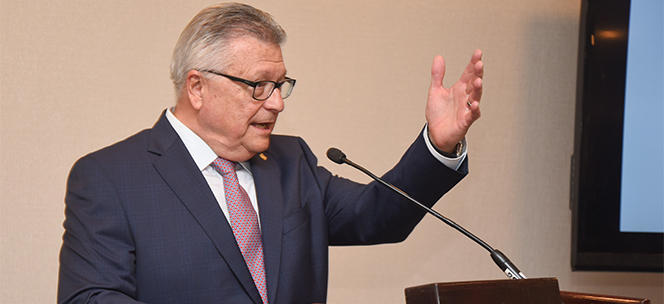Is Goodale’s carbon tax commitment remarkable clarity or a lie in the making?

There are fleeting moments when nature brings forth rare wonders: a blazing comet, an albino bison, and, most wonderous of all, a politician providing clarity.
Such a wonder illuminated Saskatchewan on Oct. 4, 2016.
“Every single penny remains in Saskatchewan and under Saskatchewan’s control,” said Liberal Member of Parliament Ralph Goodale when asked what the federal government will do with money taken from the province through a carbon tax. “Every cent.”
Such clarity – such simplicity.
And then, wonder of wonders, it happened again the very next day.
“The government of Saskatchewan will control every penny of new revenue,” said Goodale.
Even clearer clarity – even simpler simplicity.
And so, it seemed, we had a precise promise regarding the money the Ottawa plans to collect through carbon taxes. All of the money, every penny, would go to the provincial government. The provincial government would have complete control of that money. Conversely, Ottawa wouldn’t keep any of the money nor would it dictate where it would go.
But nature’s wonders can be cruelly contrary like a drought-ending rain that brings crop-crushing hail.
Ottawa recently released its draft carbon tax legislation and here’s what it says about the plan for carbon tax money collected in Saskatchewan.
“The Minister may distribute that net amount (a) to the province; (b) to persons that are prescribed persons, persons of a prescribed class or persons meeting prescribed conditions; or (c) to a combination of the persons referred to in paragraphs (a) and (b).”
That’s a significant shift.
“It provides the federal government with what appears to be a great deal of flexibility in precisely how they recycle those funds,” said University of Calgary economist Trevor Tombe in the National Post.
Flexibility? Goodale was clear: Every penny will be controlled by the Saskatchewan government. How can there be flexibility?
Here’s why that’s important: The Saskatchewan government has promised to fight the carbon tax, but, if Ottawa manages to impose a carbon tax on Saskatchewan, the province has promised to use the money to help those it harms. The premier of Saskatchewan will be Robin Hood returning carbon tax money to the people it was taken from by Prince John in Ottawa.
Would that be a ridiculous farce of a policy? Absolutely.
“Then what is really the point of this bureaucratic merry-go-round? If the solution is just to give the money back, then what is the point of collecting this tax in the first place?” Asked Premier Brad Wall rhetorically in the Saskatoon StarPhoenix. (Photo: Ralph Goodale Credit: Canadian Light Source/Flickr/Creative Commons)
It would be a farce, but it would be easily enacted. Saskatchewan charges a provincial excise tax of 15 cents per litre on gasoline. If Ottawa imposes a carbon tax of 11 cents per litre, but gives the revenue back to the province, the premier could simply lower the provincial excise tax to 4 cents and it would be a wash.
That “bureaucratic merry-go-round” may sound too dumb to be true, but one province is already going forward with a similar plan. New Brunswick is imposing a carbon tax of 2.33 cents per litre on gasoline and lowering its fuel excise tax by the same amount. It’s silly, but it’s exactly what Goodale promised.
Here’s the problem: that’s not what the legislation says. The flexibility means the feds can dole out the carbon tax cash instead of the provincial government. So, instead of the provincial government lowering provincial fuel taxes to protect those a carbon tax would harm, Prime Minister Justin Trudeau could send the money to those he deems worthy.
And so we find ourselves teetering between possibilities. On one side, we can wonder at the clarity of Goodale’s promise that every cent of carbon taxes will be provincially controlled. On the side, there’s real risk that this wonder will decompose into something ugly and all too common: a lying politician. Ottawa’s proposed carbon tax legislation is leaning to the latter.